From the Publisher: “Bones of the Earth is Edgar Award-winning author Eliot Pattison’s much anticipated tenth and final installment in the internationally acclaimed Inspector Shan series.
After Shan Tao Yun is forced to witness the execution of a Tibetan for corruption, he can’t shake the suspicion that he has instead witnessed a murder arranged by conspiring officials. When he learns that a Tibetan monk has been accused by the same officials of using Buddhist magic to murder soldiers then is abruptly given a badge as special deputy to the county governor, Inspector Shan realizes he is being thrust into a ruthless power struggle. Knowing he has made too many enemies in the government, Shan desperately wants to avoid such a battle, but then discovers that among its casualties are a murdered American archaeology student and devout Tibetans who were only trying to protect an ancient shrine…”
Don’t miss out: Eliot Pattison will be visiting Mystery Lovers on April 18!
“A page-turning whodunit… Pattison has never been better in depicting a brave man’s dangerous pursuit of justice in a ‘land of broken places and broken people.'”―Publishers Weekly (starred and boxed review)
 The devout in Tibet wear their altars on their necks, an old lama had explained to Shan years earlier, during his early days in prison. Shan had soon learned that nearly every inmate in his gulag barracks wore a prayer amulet, a gau, hung with string or a shoelace, most of them makeshift devices of folded cloth or cardboard with a prayer sewn inside. More than a few of the imprisoned monks would point to their flimsy, makeshift altar and say, only half joking, that their lives hung by a thread. When danger lurked nearby or tormented memories over- took them they would clasp a hand around their gaus and stare toward the distant snowcapped mountains. Their long, unfocused stares had unnerved Shan at first, thinking they were seeing their deaths, but a lama in his fortieth year of imprisonment had said no, they were just consulting a higher plain of existence.
The devout in Tibet wear their altars on their necks, an old lama had explained to Shan years earlier, during his early days in prison. Shan had soon learned that nearly every inmate in his gulag barracks wore a prayer amulet, a gau, hung with string or a shoelace, most of them makeshift devices of folded cloth or cardboard with a prayer sewn inside. More than a few of the imprisoned monks would point to their flimsy, makeshift altar and say, only half joking, that their lives hung by a thread. When danger lurked nearby or tormented memories over- took them they would clasp a hand around their gaus and stare toward the distant snowcapped mountains. Their long, unfocused stares had unnerved Shan at first, thinking they were seeing their deaths, but a lama in his fortieth year of imprisonment had said no, they were just consulting a higher plain of existence.
Shan found himself locked in a similarly sightless stare each time he parked at the sprawling complex before him, his hand clasped around his own little copper gau and his eyes tilted toward the square of paper draped over his steering wheel on which an intricate mandala had been drawn. At first he had cajoled himself into thinking he was engaged in meditation but eventually he had come to realize that it was more a trance that let him deny, however briefly, where he was and what he had become.
He jerked back to awareness at the sound of something striking the door of the truck he had driven from Yangkar, and he looked up into the sneering face of Major Xun Wengli, who weeks earlier had discovered Shan’s ritual and learned to respond with his own rite, loudly drumming his baton on the truck.
Shan carefully refolded the paper mandala, returned it to the glove box, and climbed out. Xun pointed with his baton at the gau that still hung exposed on Shan’s chest, laughing at Shan’s embarrassment. Shan ignored him, stuffing the prayer amulet back inside his shirt then walking around to the passenger door to retrieve the uniform tunic that hung there. Xun looked disappointed as Shan fastened the top button of the new constable’s tunic, then gestured him toward the three-story concrete building in front of them.
Colonel Tan, governor of Lhadrung County, had not indicated why he wanted Shan in Lhadrung town, seat of the county government, but Shan had assumed he had sent Xun, his senior adjutant, to make certain Shan attended still another briefing on the latest People’s Congress or one more lecture on the new, ever-stricter law enforcement initiatives in Tibet.
To his surprise the form he was given to sign by the receptionist in the new government center had his name printed beside the signature line, and the list held fewer than twenty other names, most of which he recognized. It was to be a very private propaganda session. He hesitated when they reached the auditorium door, looking for Colonel Tan, then Xun pushed him past the door, down an unfamiliar corridor. With a chill he saw he was being taken into the new office complex for the Public Security Bureau, which was rapidly expanding its presence in the county. His mind raced as he tried to recall the other names on the registry he had signed. Some were other constables, some senior military officers under Tan—including the wardens of three of his infamous prisons—and two were names that often appeared prominently at the bottom of directives issued by the Public Security headquarters in Lhasa. One of those recent directives had announced a campaign in which officials would be required to swear new loyalty oaths to Beijing while connected to lie detectors. Is that where the gloating
Xun was taking him? Shan found himself slowing, his feet leaden. If he had been summoned to be tested by a lie detector, then he would likely be back in a prison cell before nightfall, or at least unemployed and homeless.
“Quickly, Constable!” came Xun’s impatient urging. “Can’t be late!” The major motioned Shan through a pair of double doors into a large two-level chamber that had incorporated a natural rock wall on the far side. A shiver ran down his spine as he saw the faded images of a lotus flower on the whitewashed stone, and he recalled that the new government center, like many others in Tibet, had been deliberately built on the site of a former temple. The lower half of the room had been part of a chapel, no doubt one of the subterranean gonkang where fierce, sometimes hideous, protector demons would have been worshipped.
Two rows of seats were arranged to overlook the lower, stagelike level, and Major Xun directed Shan to the only one that was still empty, the last chair in the first row. All the other chairs seemed to be occupied by the others who had signed the registry. One of the gray-uniformed Public Security officers, which the Tibetans called knobs, stepped to a podium at the edge of the little balcony they sat in, nodding to some- one out of sight below. As the officer began to read in a rapid, singsong voice from a file before him, Shan studied the lower chamber. Long ago, shelves had been chiseled into the stone face where figurines of lesser deities would have been arranged. The whitewash on the back wall did not entirely conceal the soot stains that started halfway up the wall, where for decades, probably centuries, butter lamps would have burned on an altar, tended night and day by novice monks. Through the whitewash Shan could now make out dim ghostly images of de- mons which had been painted over the altar. Some of the old Tibetans believed that the demons actually resided in the old gonkangs. One of the protector demons was being crushed by the concrete wall of the new construction. The central figure showed through only faintly, but as Shan studied it he made out a feminine shape with four arms, two of which held a bow and arrow.
When the knob finished droning about some criminal enforcement matter, a door could be heard opening below him and a Tibetan janitor appeared. The gallery watched with a strange fascination as he uncoiled a hose then leaned a mop in the corner where the ledge met the concrete wall before disappearing and returning with a metal armchair. A murmur of nervous laughter rippled through the audience as he stumbled on the hose before placing the chair near the back wall. Shan looked again for Colonel Tan, governor of the county, who had ordered him to the compound, but saw neither the colonel nor his steadfast matronly assistant Amah Jiejie. Xun caught his gaze with a thin, expectant grin. A Public Security sergeant appeared below, leading a middle-aged Tibetan with thinning hair whose face seemed empty, devoid of expression. The Tibetan shook off the knob’s hand, then straightened his clothing, marched to the chair and sat. He looked up at his audience, briefly fixing his intelligent, piercing gaze on each of the men and women in the chairs. Shan was last, and the man’s gaze lingered on him, with a hint of curiosity in it now. As he looked at Shan he loosely curled the fingers of one hand and held them briefly over his chest. Another, younger, Public Security officer appeared, a lieutenant whose hair had unusual tinges of auburn in it. He bowed his head to the spectators before turning to the Tibetan. The young knob’s thin lips were set in stern determination, but Shan thought he detected a hint of amusement in his eyes.
“Chou Folan?” the lieutenant asked.
The prisoner ignored him. A Chinese name had been assigned to him but he refused to acknowledge it.
The lieutenant glanced up at the officer at the podium, who gave an impatient nod.
“Metok Rentzig,” the lieutenant stated. “Yes,” the Tibetan replied in a melancholy tone. Then he suddenly twisted toward the ghostly demon on the wall behind him. “Om Kurukulla hrih hum svaha!” he called out, defiance in his voice now.
Shan’s heart wrenched as he saw the weapon in the young officer’s hand. With a quick upward motion, the knob leveled the pistol and shot Metok in the head.
Excerpted from Bones of the Earth by Eliot Pattison. Copyright © 2019. All rights reserved. No part of this excerpt may be reproduced or reprinted without permission in writing from the publisher.

























